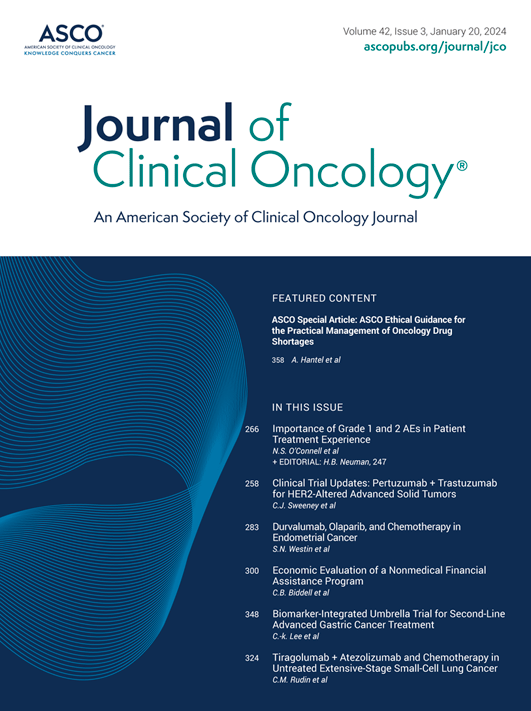一线Nivolumab联合低剂量Ipilimumab治疗微卫星不稳定性-高进展期胃癌或食管胃结癌的II期研究(无限制,WJOG13320G)。
IF 42.1
1区 医学
Q1 ONCOLOGY
引用次数: 0
摘要
微卫星不稳定性高(MSI-H)晚期胃癌或食管胃结癌(AGC)占所有AGC病例的5%-6%,对免疫治疗的反应性增强。我们进行了一项单组II期研究,以评估nivolumab (NIVO)和低剂量ipilimumab (IPI)联合治疗MSI-H AGC的一线治疗效果。患者和方法MSI-H AGC患者接受NIVO (240 mg/kg,每2周1次)和IPI (1 mg/kg,每6周1次)治疗。主要终点是通过盲法独立中心评价的总缓解率(ORR)。次要终点包括疾病控制率(DCR)、无进展生存期(PFS)、总生存期(OS)、安全性和生物标志物分析。使用MSI-IVD试剂盒(Falco)确认MSI-H状态。结果共纳入29例患者。ORR为62.1% (95% CI, 42.3 ~ 79.3),完全缓解率为10.3%。DCR为79.3% (95% CI, 60.3 ~ 92.0)。93.1%的患者出现了任何级别的治疗相关不良事件(TRAEs), 37.9%的患者出现了≥3级的不良事件。在数据截止时(中位随访时间为9.0个月),有21例患者停止治疗,其中12例(41.4%)患者因trae而停止治疗。然而,在排除1例进展性疾病患者后,其余11例患者在停药后显示长期抗肿瘤疗效(缓解持续时间范围为0.9+至15.6+个月)。中位PFS为13.8个月(95% CI, 13.7个月至未达到[NR]),中位OS为NR (95% CI, 13.7个月至NR), 12个月OS率为79.5%。结论nivo联合LD-IPI作为治疗MSI-H型AGC的一线药物,具有稳定、持久的抗肿瘤疗效。尽管TRAEs经常导致治疗中断,但大多数患者的治疗效果随后得以维持。本文章由计算机程序翻译,如有差异,请以英文原文为准。
Phase II Study (NO LIMIT, WJOG13320G) of First-Line Nivolumab Plus Low-Dose Ipilimumab for Microsatellite Instability-High Advanced Gastric or Esophagogastric Junction Cancer.
PURPOSE
Microsatellite instability-high (MSI-H) advanced gastric or esophagogastric junction cancer (AGC), accounting for 5%-6% of all AGC cases, has shown an enhanced responsiveness to immunotherapy. We performed a single-arm phase II study to evaluate the combination of nivolumab (NIVO) and low-dose (LD) ipilimumab (IPI) for first-line treatment of MSI-H AGC.
PATIENTS AND METHODS
Patients with MSI-H AGC received NIVO (240 mg once every 2 weeks) and IPI (1 mg/kg once every 6 weeks). The primary end point was overall response rate (ORR) assessed by blinded independent central review. Secondary end points included disease control rate (DCR), progression-free survival (PFS), overall survival (OS), safety, and biomarker analysis. MSI-H status was confirmed with an MSI-IVD Kit (Falco).
RESULTS
Twenty-nine patients were enrolled. The ORR was 62.1% (95% CI, 42.3 to 79.3), with a complete response rate of 10.3%. The DCR was 79.3% (95% CI, 60.3 to 92.0). Treatment-related adverse events (TRAEs) of any grade occurred in 93.1% of patients, with those of grade ≥3 manifesting in 37.9% of patients. At the data cutoff (median follow-up of 9.0 months), treatment had been discontinued in 21 patients, with such discontinuation being due to TRAEs in 12 (41.4%) patients. However, after exclusion of one patient with progressive disease, the remaining 11 patients showed long-term antitumor efficacy after treatment discontinuation (range of response duration, 0.9+ to 15.6+ months). The median PFS was 13.8 months (95% CI, 13.7 months to not reached [NR]) and the median OS was NR (95% CI, 13.7 months to NR), with a 12-month OS rate of 79.5%.
CONCLUSION
NIVO plus LD-IPI showed robust and durable antitumor efficacy as a first-line treatment for MSI-H AGC. Although TRAEs often led to treatment discontinuation, treatment efficacy was subsequently sustained in most patients.
求助全文
通过发布文献求助,成功后即可免费获取论文全文。
去求助
来源期刊

Journal of Clinical Oncology
医学-肿瘤学
CiteScore
41.20
自引率
2.20%
发文量
8215
审稿时长
2 months
期刊介绍:
The Journal of Clinical Oncology serves its readers as the single most credible, authoritative resource for disseminating significant clinical oncology research. In print and in electronic format, JCO strives to publish the highest quality articles dedicated to clinical research. Original Reports remain the focus of JCO, but this scientific communication is enhanced by appropriately selected Editorials, Commentaries, Reviews, and other work that relate to the care of patients with cancer.
 求助内容:
求助内容: 应助结果提醒方式:
应助结果提醒方式:


